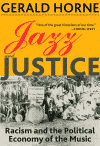Race

New Directions in a Life with Marxism
The history and nature of racial capitalism remain primary questions of our times. Its true significance and gravity threaten to reveal everything about our contemporary world, from our immediate social arrangements to the global system. Within this, corporate power and the hegemonic culture shape the world at the limits of our perceptions. We must simultaneously engage the contemporary politics of knowledge production around these issues, both within the academy and in popular culture. | more…

Oliver Cromwell Cox insisted on dealing with the crucial issues of his time and on telling the truth as he saw it, regardless of whose toes may have been stepped on or whose sensibilities may have been injured. He has aided in preventing the complete stultification of academic social science and in the long run exercised an immense influence on American life. | more…

The rise to prominence of analyses of racial capitalism represents a breakthrough in Marxian theory. This has necessarily been accompanied by a critique of previous Marxian analyses, which all too often ignored or minimized the relation of slavery to capitalism. In recent years, however, these criticisms of orthodox Marxist treatments of slavery have been extended, much more problematically, to the work of Karl Marx himself. Although Marx never wrote a treatise on slavery, the issue of slave labor was woven into his analysis of social formations, both ancient and modern, and was inextricably intertwined with his treatment of wage labor. | more…

August 2019 saw numerous commemorations of the year 1619, when what was said to be the first arrival of enslaved Africans occurred in North America. Yet in the 1520s, the Spanish, from their imperial perch in Santo Domingo, had already brought enslaved Africans to what was to become South Carolina. The enslaved people here quickly defected to local Indigenous populations, and compelled their captors to flee. Deploying illuminating research, The Dawning of the Apocalypse is a riveting revision of the “creation myth” of settler colonialism and how the United States was formed. Here, Gerald Horne argues forcefully that, in order to understand the arrival of colonists from the British Isles in the early seventeenth century, one must first understand the “long sixteenth century”—from 1492 until the arrival of settlers in Virginia in 1607. | more…

As the long history, right to the present day, of police and vigilante violence against black people has shown with great clarity, the racial chasm between black and white people in the United States lives on. A few black men and women have climbed into the 1 percent, and a sizable African-American middle class now exists. But by every measure of social well-being, black Americans fare much worse than their white counterparts. Just as for the economic, political, and social distance between capitalists and workers, so too is there a differential between black and white people, for these same interconnected components of daily life continue because of the way our system is structured. | more…

In Bill Fletcher Jr.’s first novel, The Man Who Fell from the Sky, the sleepy Cape Cod town of Osterville has blood on its hands. In this murder mystery, Fletcher digs through layers of racism in Southern Massachusetts to uncover more than the killer’s identity. The novel compellingly exposes the racism of society, turning its victims against each other. | more…

A new poem by Kenneth Salzmann, author of The Last Jazz and Other Poems. | more…

The music we call “jazz” arose in late nineteenth century North America—most likely in New Orleans—based on the musical traditions of Africans, newly freed from slavery. Grounded in the music known as the “blues,” which expressed the pain, sufferings, and hopes of Black folk then pulverized by Jim Crow, this new music entered the world via the instruments that had been abandoned by departing military bands after the Civil War. Gerald Horne’s Jazz and Justice: Racism and the Political Economy of the Music examines the economic, social, and political forces that shaped this music into a phenomenal U.S.—and Black American—contribution to global arts and culture. | more…

The world is burning, flooding, and politically exploding, to the point where it’s become abundantly clear that neoliberal feminism—the kind that aims to elect The First Woman President—will never be enough. In her vibrant, politically personal essay, Zillah Eisenstein asks us to consider what it would mean to thread “socialism” to feminism; then, what it would mean to thread “abolitionism” to socialist feminism. Finally, she asks all of us, especially white women, to consider what it would mean to risk everything to abolish white supremacy, to uproot the structural knot of sex, race, gender, and class growing from that imperial whiteness. | more…

Fourteen provocative papers on the oppression of women in capitalist countries, along with three articles on the subordinate position of women in two communist countries, Cuba and China. These important, often path-breaking articles are arranged in five basic sections, the titles of which indicate the broad range of issues being considered: Introduction; motherhood, reproduction, and male supremacy; socialist feminist historical analysis; patriarchy in revolutionary society; socialist feminism in the United States. The underlying thrust of the book is toward integrating the central ideas of radical feminist thought with those pivotal for Marxist or socialist class analysis. | more…

This reprint of Keeanga-Yamahtta Taylor’s introduction to How We Get Free—Black Feminism and the Combahee River Collective serves as an introduction to both the Combahee River Collective and their seminal statement on black feminism. | more…

The most general statement of our politics at the present time would be that we are actively committed to struggling against racial, sexual, heterosexual, and class oppression and see as our particular task the development of integrated analysis and practice based upon the fact that the major systems of oppression are interlocking. The synthesis of these oppressions creates the conditions of our lives. | more…











